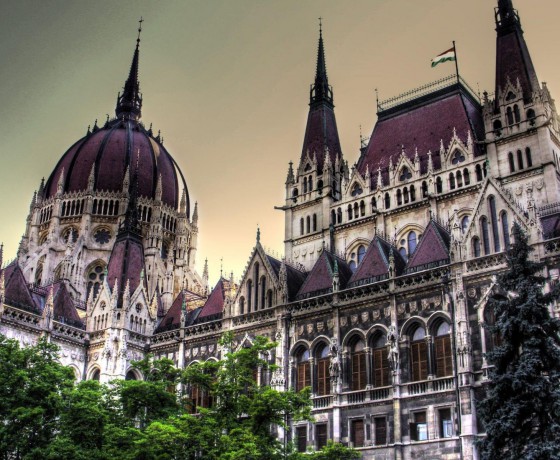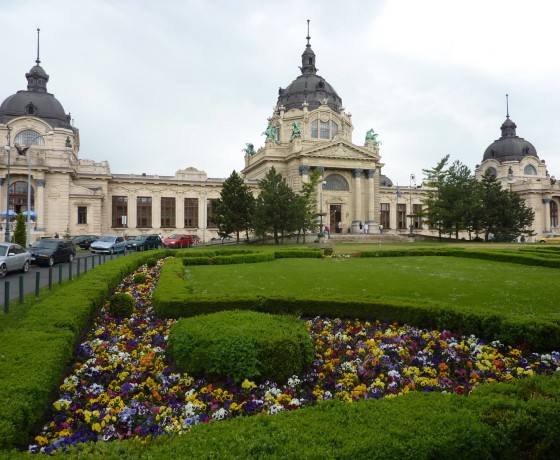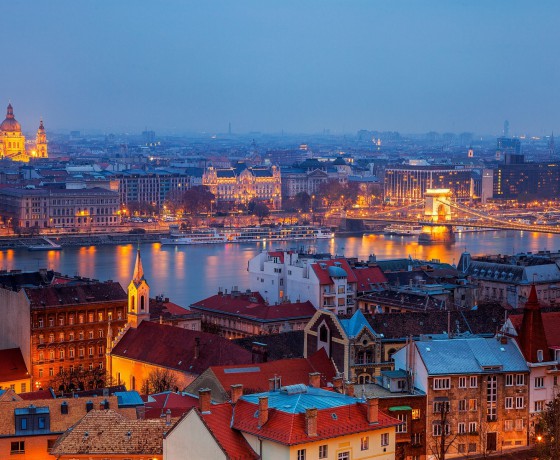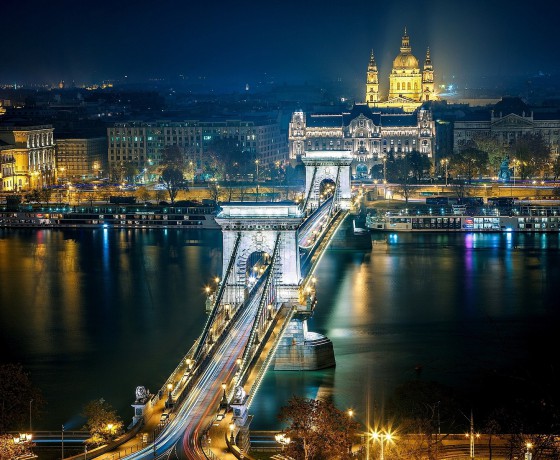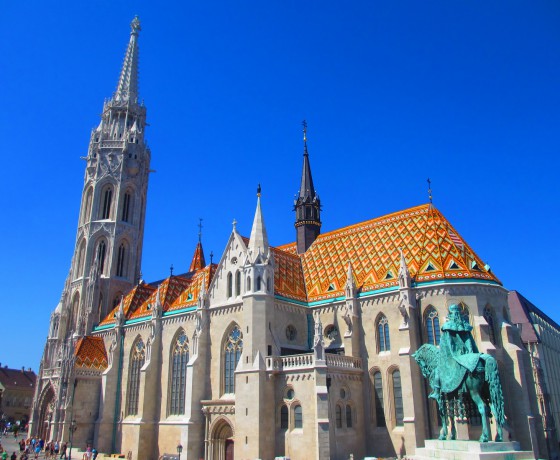Budapest
In 1987 Budapest was added to the UNESCO World Heritage List for the cultural and architectural significance of the Banks of the Danube, the Buda Castle Quarter and Andrássy Avenue.
More information on Wikitravel
Outside Budapest, there are alternative international airports in Debrecen, Sármellék, Győr-Pér and Pécs-Pogány.
- Airport Terminals
The airport has two terminals, 2A and 2B, being within a short walking distance from each other. The number 2 appearing in their names is due to the the former (originally opened in the 1950, reopened 2005) Terminal 1 closed recently.Terminal 2 (opened in 1985) is divided into Terminal 2A (gates 20-30), serving Schengen Area destinations, and Terminal 2B (gates 11-19) serving non-Schengen Area destinations.
Duty free stores are operated by Travel Value. Customs authorities in German airports may not allow you to bring duty-free items purchased at the airport in Budapest through Germany. In Terminal 2, Hugo Boss and Swarowski are the only dedicated brand shops. The alcohol-tobacco-sweets assortment shop has a choice of local wines, mainly by Gundel. You can find Caffè Ritazza eateries in Terminal 2A, both in the pre-check-in area and the in the boarding area. Terminal 2B pre-boarding area offers half a dozen cafés and fast food restaurants which are surprisingly not overpriced as on other airports.
- Connections
Hungarian low cost airline Wizz Air operates flights between Budapest and more than twenty European cities. Currently, there are no direct flight from the US to Budapest, American Airlines cancelled their NYC-Budapest flight in Feb 2012. Many low cost airlines also operate service to/from Budapest. London Heathrow is connected by a number of flights by British Airways (codeshared with American Airlines), while discount airlines fly to London Luton, Gatwick and Stansted (2012). Paris is connected by flights from Air France (Roissy-Charles-de-Gaulle), and various low-cost companies (EasyJet from Orly, Ryanair and Wizz from Beauvais).As of 2012, the following low cost airlines operate to and from Budapest:
- Aer Lingus (from Ireland) – Terminal 2B;
- EasyJet (from France, Germany, Great Britain and Switzerland);
- Germanwings (from Germany);
- Jet2 (from Great Britain);
- Norwegian Air Shuttle (from Denmark, Finland, Norway and Sweden);
- Ryanair (from Belgium, Denmark, Finland, France, Great Britain, Greece, Germany, Ireland, Italy, Netherlands, Norway, Poland, Spain, and Sweden);
- transavia.com (from the Netherlands);
- WizzAir (from Azerbaijan, Belgium, Bulgaria, Finland, France, Germany, Great Britain, Greece, Israel, Italy, Netherlands, Norway, Malta, Poland, Romania, Russia, Spain, Sweden, Turkey, Ukraine and United Arab Emirates).
- Public transport
There is a train station called Ferihegy next to former Terminal 1, from where suburban trains (called ‘személy’) run twice an hour to Budapest-Nyugati station in the city centre, taking 25 minutes. Although the trains are suburban trains, they are operated by MÁV and not included in the HÉV network. (Dedicated train tickets can be purchased from cashiers or vending machines next to the cashiers in the pedestrian underpass in Nyugati – press the button ‘Ferihegy’; normally the machine can give change. At Ferihegy station there is a modern ticket vending machine at the platform towards Budapest. A single full-fare train ticket costs 370 HUF for this travel, but local public transport travelcards, called Budapest pass or Budapest travel card are also valid. These can be purchased at the post office on the mezzanine level of the airport. If entering the train without ticket, you will pay an additional fine of approx. 2500 HUF , unless no cashier or vending machine was available at the station.)Public transport between Ferihegy train station and Terminals 2A/2B is provided by the local bus 200E, running every 8-15 minutes, and travel time approx 10 min. The bus stop towards the Airport is situated directly next to the train station, but you have to pass a pedestrian bridge with elevators not always working. (Within the bus, this stop is called “Ferihegy vasútállomás” – i.e. train station – in case you want to get off there.) Alternatively you can pre-order a taxi by phone to wait in the bus-stop, to get to the Airport faster or at night. Single bus tickets are available in airport terminals for HUF 350 at the newspaper vendors, or can be purchased from the driver for HUF 450.
The same bus line 200E runs somewhat further into the city, ending at the end station of metro M3 Kőbánya-Kispest, a small local transport hub. Note that for transferring there to the metro, another 350 HUF-ticket is required. There exists a transfer ticket (átszállójegy) for 530 HUF which may be used all the way from the airport to the city center, but for unknown reasons these tickets are not sold in the machines. Get a transfer ticket from the BKK kiosk at the airport. If you return to the airport after your stay in Budapest, make sure you buy two transfer tickets (one from the airport to the city and the other from the city back to the airport). The trip from the airport to Deák Ferenc tér metro station takes about 45 to 60 minutes. During nighttime (11 pm to 4 am) the 900 Nightbus departs Terminal 2 every 30 to 60 minutes, providing connectivity with the 950 Nightbus stop at Bajcsy-Zsilinszky út. The 950 bus travels to Rákospalota via the City Center (Deák Ferenc tér) and Nyugati railway station.
In addition to személy suburban trains, Ferihegy also has long-distance trains (called ‘InterCity’ or ‘gyors’) to a number of other cities such as Szeged, Kecskemét, Debrecen´and Miskolc. (Warning: On the outbound platform there are some Intercity trains with Budapest-Keleti as destination – do not take this to get to Budapest as this is a ring service starting at Budapest-Nyugati and going through Ferihegy and eastern Hungary before terminating at Budapest-Keleti – taking some 5 h 45 min and costing 6660 HUF). Long-distance trains to Budapest require a seat reservation which costs a couple of hundred HUF so unless you’re in a hurry, stick to the trains labelled ‘személy’.
- Airport Shuttle
Shared mini-van operation regulated by the Airport that collects passengers going in the same direction and will take you to or from anywhere in Budapest for HUF 3.200 per person or HUF 5.500 for a round trip. Buy your ticket and join the queue at the airport and you will be on your way in 15 minutes. For the trip back, call the centre at +36-1 296-8555 at least 24 hours beforehand and Airport Minibus will pick you up. Buy tickets in the Arrival hall and near the main exit. Will drop you at any address in the city and/or suburbs. - Taxi
The only contracted taxi operator from Liszt Ferenc airport is Főtaxi. Depending on your destination, the cost for a trip to Budapest will range from 5,000 to 10,000 HUF. (Taxis now universally cost 450 HUF base price and 280 HUF for every kilometer. The inner city is around 20 kilometers from Terminal 2.)Be very wary of the so called “Taxi Cowboys” who solicit passengers, they will quote you a reasonable fare then demand much higher payment when you arrive to your destination. Stick with the Airport Shuttle, Reserved private transfer, Public transport or the Taxi Stand in front of the Arrivals Hall.
- Private transfer
Online reservation: Airport Transfer Budapest. Specific Airport Transfer Service to meet you inside or outside, as you exit the secure area, with a sign with your name on it. If you have a particular desire to be met by a driver on arrival, or want a specific kind of car, or have special individual needs like a baby seat or wheelchair, you may want to book in advance with a specific airport transfer service or driver.


